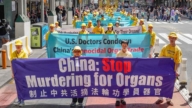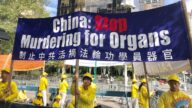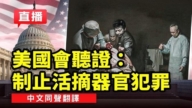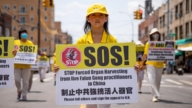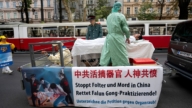【新唐人2012年12月04日讯】最近,台湾立法院通过一决议案,请台湾卫生署,要求各大医疗院所和医师,有病患在境外接受器官移植,返台后申请术后健保相关给付时,应登录移植国别等详细资料。为什么台湾立法委员们作出这样的决议﹖一起去了解﹕
台湾立法院表示,根据台湾卫生署统计,2000年到2011年台湾人前往境外接受器官移植总人数,以大陆1754人最多,占88.6%。又全民健保自2005年到2011年术后抗排斥药给付达77亿 3454万台币。因此,决议请卫生署在三个月内要求各大医疗院所和医师,凡是在境外接受器官移植,返国后在申请术后健保相关给付的病人,应登录病人移植器官的国别及医院等讯息(包括执行手术医师),以确保资讯透明及健保合理给付。
台湾立法院认为,目前,卫生署并没有相关法规要求在境外接受器官移植的病患,接受台湾健保补助领取抗排斥药时,需要登录器官捐赠系统,和注明移植医院及医师,以致不知是否有器官来源不明而成为活摘器官帮凶的情形。
决议案内容提及,今年5月,美国国务院公布去年年度人权报告,在“中国章节”部分首次提到中国器官移植,同时,海内、外媒体、以及人权团体持续不断报告有关法轮功学员、维吾尔族被活摘器官的案例。
12月3号,“追查迫害法轮功组织”发言人汪志远向《新唐人》表示,这项决议案是在国际范围内,制止中共活摘法轮功学员器官暴行的一个可喜的进步。中共的罪行是针对全人类,不仅仅是针对法轮功学员。
汪志远:“所以每一个国家、每一个政府、每一个团体都有责任起来制止这个暴行,就是维护人类最基本的道德良知,人类赖以生存最基本的条件,所以制止活摘器官这件事情的继续发生,简单的说就是人类的保卫战,我们也呼吁全世界各国政府都应该行动起来。”
前台湾人权促进会会长邱晃泉律师认为,要求必须登录,就可以显现出实际人数及来源。透过健保给付的查核,向院所、医生和病人施压。
邱晃泉:“那个决议不是法律。如果成效不够、不彰的话,接下去应该再推动让它(成为)很明确的是一个法律。也可透过审查的过程中导引出,那些不明的器官从何而来﹔至少可以相当程度的搜集,最后揭发出来。”
由于,台湾媒体对于中共活摘法轮功学员器官的暴行鲜少报导,因此,台湾民众对此了解不深。邱晃泉认为,目前台湾政府的宣导还不足够,他呼吁台湾民间组织、政府,特别是卫生署应该要加强宣传,让普通百姓、病人及医疗院所了解。
邱晃泉:“都应该了解这些不明来源的器官的背后,潜藏着非常不道德,没有人性的摘取。这应该会更有效的遏止到中国接受不明器官的移植。也就是说,要让大家了解不要在不知情的情况下,变成中共侵害人权、迫害法轮功,变成中共反人类罪行的帮凶。”
人权律师叶宁则指出,这个议案对于经济上不依赖健保的民众,不能起到惩罚和警戒的作用。
人权律师叶宁:“在中共这个器官来源是如此日益明显的情况下,就是这样一种反人类的罪行越来越遭到公开揭露的情况下,作为这种罪恶器官来源的买方,可以说是这种罪行当中的共犯,这也是被动的共犯,而且是这种罪行的受益者和这种罪行的市场来源。”
台湾立法委员田秋堇表示,许多人第一次听到中共活摘器官时都非常惊骇,主决议送出来时没有很大的争论。主决议和台湾卫生署的预算挂在一起,根据预算法,台湾立法院审查明年度预算,必须在这个会期之前要三读通过,主决议跟着通过就有法律的效益。
采访编辑/梁欣 后制/李月
Taiwan Passed Organ Transplants’ Resolution
Recently, Taiwan’s Legislative Yuan passed a resolution
regarding organ transplantation.
It asks Taiwan’s Department of Health (DOH) to require
major medical institutions and doctors to collect detailed data,
when patients apply for health insurance benefits
after receiving transplants abroad.
Taiwan’s Legislative Yuan stated DOH’ statistics, that 1754
patients (88.6%) received organ transplants in Mainland China from 2000 to 2011.
From 2005 to 2011, the National Health Insurance expenses
for anti-rejection drugs after organ transplants was New Taiwan Dollar 7.7 billion (US$ 266 million).
In order to ensure transparency of information and
reasonable health insurance benefits, the resolution asks DOH to require specific information.
Major medical institutions and doctors are asked
to start within three months to collect information,
from those who apply for the health insurance benefit
after receiving transplants abroad.
They need to disclose the name of the country,
the hospital, and surgeons involved in the transplantation.
Taiwan’s Legislative Yuan thinks currently DOH does not
have regulations requiring from patients such information.
Thus it is unknown if they could be
a possible accomplice of live organ harvesting.
The resolution mentions that in May, 2012, U.S. State
Department published, ‘The 2011 Country Reports on Human Rights Practices,’
It mentions for the first time organ transplants
in the chapter about China.
At the same time, media and human rights organizations
continuously report cases of live organ transplants of Falun Gong practitioners and Uighur people.
On December 3, World Organizations to Investigate the
Persecution of Falun Gong (WOIPFG) spokesman Wang Zhiyuan spoke to NTD.
Wang said this resolution is a positive step from the world,
to stop the brutality of the Chinese Communist Party (CCP)’ s live organ harvesting of Falun Gong practitioners.
The CCP commits crime against humanity,
not only against Falun Gong practitioners.
Wang Zhiyuan: “Therefore every country, every government,
every group has responsibility to put these atrocities to an end.
This is to maintain the most basic human moral conscience,
and the basic conditions for human survival.
So actions to stop live Organ Harvesting should continue.
It is simply a battle to protect mankind.
We also call on governments around the world
to act upon it.”
Taiwan Human Rights Association’ founder and chairman
Chiu Huang-chuan thinks it is a must to register information, showing actual number of patients and organ sources too.
Hospitals, doctors and patients are pressured
via insurance benefits.
Chiu Huang-chuan: “The resolution is not in the law.
If it turns out to be not so effective, we should continue to make it into a law.
We can also get the information through registration
on the sources of the organs and publish the result.”
As media in Taiwan rarely report on live organ harvesting
of Falun Gong practitioners, people in Taiwan do not have good understanding of this issue.
Chiu believes the Taiwan government
needs to report more on the issue.
He calls on Taiwan’s government, NGO’s, especially DOH,
to stress on publishing these news to let people, patients and hospitals know about it.
Chiu Huang-chuan: “We should all be informed that organs
from unknown sources carry very immoral and inhumane crimes.
This should curb more effectively the problem of people
accepting unknown organ transplantations in China.
In other words, we want
everybody to know about it.
We do not like people to unknowingly become accomplices
of CCP’ human rights violations and Falun Gong persecution.
Human rights lawyer Ye Ning points out, this resolution
will not have warning or punishment effect for those, who do not need National Health Insurance.
Ye Ning: “With the sources of organs and the crime against
humanity in China getting increasingly obvious,
buyers of these organs can be regarded as accomplices,
beneficiaries and prime movers of such crimes.”
Taiwan Legislative Yuan member Tien Chiu-chin said, many
people were shocked to hear about CCP’s live organ harvesting crimes.
The main resolution, tied with DOH’ s budget,
did not encounter much debates.
Based on the Budget Law, Taiwan Legislative Yuan’s audit
of 2013 Budget must pass three readings.
The main resolution will have legal effect
once it is passed together with the Budget.




